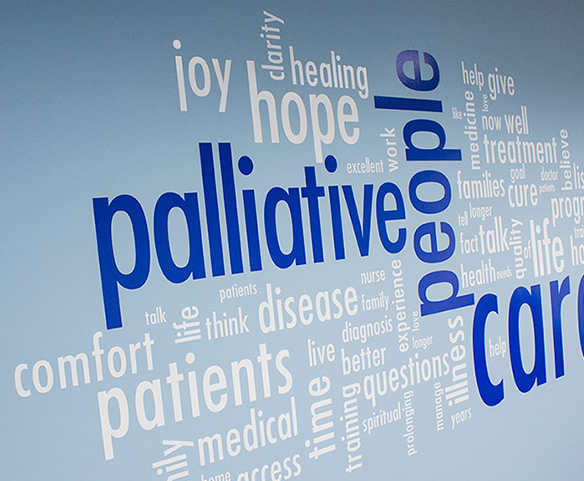Promising Practices:
Homeless Palliative Care
Mary Ann Priester
Senior Management Analyst
Mecklenburg County Community Support Services
A recent blog provided an overview of homeless palliative care and outlined the need for homeless palliative care in Mecklenburg County by quantifying the significant number of people in Charlotte-Mecklenburg who are both experiencing homelessness and facing terminal or life-limiting illnesses.
This blog explores promising practices in homeless palliative care and what it would take to address the local need for homeless palliative care in Mecklenburg County.
HOMELESS PALLATIVE CARE: A REFRESHER
Palliative care is not just end of life care. It’s also a specialized form of medical care that focuses on enhancing the quality of life of people who are dealing with life-limiting illnesses. For individuals experiencing homelessness, access to palliative care is a critical need because unstable housing, compounded by lack of access to healthcare and social support, can often worsens their health conditions. Homeless palliative care adapts traditional palliative practices to meet the needs of those without permanent housing by ensuring dignity, compassion, and individualized support for those navigating both serious illness and homelessness.
HOMELESS PALLATIVE CARE: PROMISING PRACTICES
Some promising practices of homeless palliative care have emerged. The following practices focus on outreach, compassion, and providing person centered care.
Outreach-based Palliative Care
Outreach-based palliative care meets people where they are at and bypasses traditional barriers that impact access to care. This type of palliative care can be offered via mobile health clinics, outreach programs, and hospice services that meet people where they live and provide services. The teams consist of nurses, social workers, and doctors who bring palliative care to people living in shelters and on the streets.
Hospice Services for the People Experiencing Homeless
Some hospice centers have adapted their services to provide palliative care to people who are unhoused. These centers provide a safe space where people can access food, supportive services, and sometimes residential care beds.
Integrated Health and Housing Programs
Some permanent supportive housing programs have integrated palliative, medical respite, or hospice services into their programs. The Mecklenburg County Continuum of Care (CoC) has a program that integrates health care and permanent supportive housing. While this program was not created for the purpose of providing palliative care, the program does integrate health services into the program to ensure the needs of the people in the program who have life-limiting illnesses can receive healthcare with dignity in a stable housing.
The PEACH Model
The Palliative Education and Care for the Homeless (PEACH) model of palliative care is an outreach-based model of palliative care focused on serving people who have serious or life-limiting illnesses and are experiencing homelessness. Mobile interdisciplinary teams provide trauma-informed, holistic, culturally competent care to people wherever they are at. Typical care locations include but are not limited to the streets or in encampments, in shelters, at drop-in centers, or in transitional housing.
Care Team
The PEACH model is similar to a typical street outreach model in that the care team works to engage people and build trust while offering to support in navigating their medical, legal and housing needs. Also similar to street outreach teams, the PEACH teams are interdisciplinary and consist of palliative care physicians, nurses, social workers, case managers, peer support workers, and sometimes addiction specialists or spiritual care providers.
Core Components
- Mobile Care Delivery: Care Team brings care to the client wherever they are located.
- Flexible Care Goals: Goals are client driven and crafted to meet the immediate needs of the person.
- Rapport and Trust Building: The care team works to build trust with the client and strives to provide consistent care.
- Advanced Care Planning: The care team supports the client in medical decision-making and planning for end of life.
- Dignified Death: End of life plans aligns with the clients wishes and are implemented with dignity, care, and support.
Cost to Implement
A case study of the PEACH program implemented in Toronto, Canada in 2019 reported annual operating costs of approximately $450,000. These operating costs included 2 physicians, a social worker, a nurse, admin support, travel, supplies, and training. The program served 100 people in the first year and the evaluation study showed that the program reduced ER usage and hospital stays.
The cost to implement the PEACH model varies depending on the geographic location, community healthcare partnerships, and amount of in-kind support. Government grants such as HRSA, SAMSHA, and State Medicaid, non-profit and foundation philanthropic partners, and healthcare partnerships with local healthcare systems could all be leveraged to support the implementation of PEACH or other homeless palliative care approaches.
Studies have shown that the PEACH model has been effective in reducing public healthcare spending, decreasing ER visits, and hospitalizations, and reducing overall healthcare system burden. It also has been shown to improve quality of life and ensure that some of the most vulnerable members of our communities die in comfort with dignity and support.
SO WHY DOES THIS MATTER?
Promising practices and models like PEACH demonstrate that it is not only compassionate and ethical to implement homeless palliative care to people experiencing homelessness but it is also feasible, impactful, and necessary to implement a care solution that brings quality, person-centered care to residents of Mecklenburg County who are experiencing homelessness and life-limiting illness. Adapting and investing in these practices can improve health outcomes, reduce the burden on emergency services, and ensure that every person, regardless of housing status, has access to care that honors their life and death with dignity.


